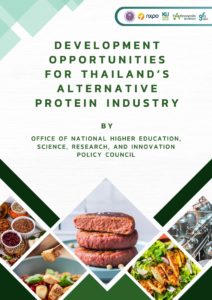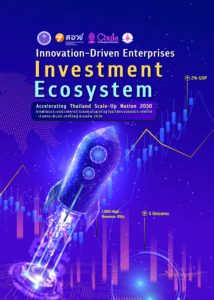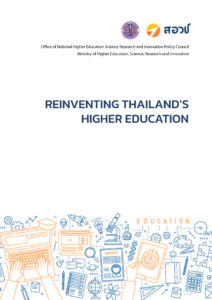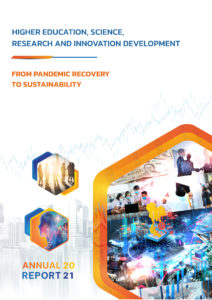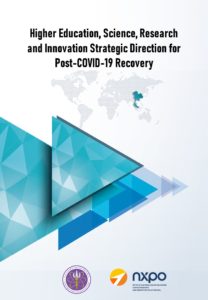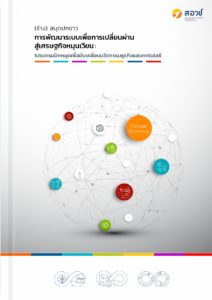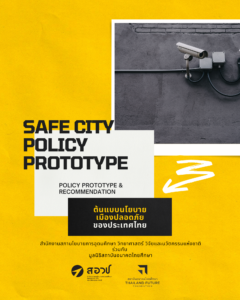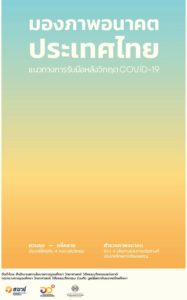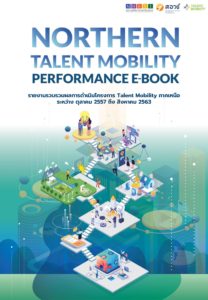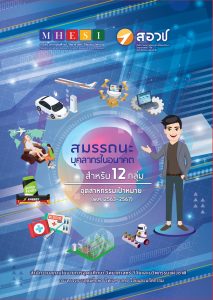| Cover / Download | Detail |
Thailand has positioned “Future Food” as one of its new S-Curve industries, a strategic pillar for driving national transformation across economic, social, and environmental dimensions. With a target to expand the industry’s value from 330 billion THB to 500 billion THB by 2030, the government is advancing policies that promote investment, R&D, regulatory reform, and integrated marketing strategies to strengthen competitiveness and sustainability. Among the four pillars of Thailand’s Future Food strategy—functional foods & functional ingredients, personalized and medical foods, organic and whole foods, and alternative proteins—the alternative protein sector has emerged as a frontier of innovation. This sector, encompassing plant-based, fermentation-derived, and cultivated protein products, presents high potential for value creation, sustainability, and export growth. However, it also demands new supply chains, robust R&D, and a skilled workforce to achieve global standards in taste, nutrition, safety, and affordability. The Ministry of Higher Education, Science, Research and Innovation (MHESI) and the Office of National Higher Education Science Research and Innovation Policy Council (NXPO), together with Food Innopolis (Kasetsart University) and the Good Food Institute Asia Pacific (GFI-APAC), have jointly initiated a dialogue to identify gaps and opportunities strategic for Thailand’s alternative protein ecosystem. Three priority areas have been identified for development:
With strategic policy direction, investment in innovation infrastructure, and targeted workforce upskilling, Thailand can establish itself as a future food innovation. Collaboration across government, academia, and industry will be essential to strengthen competitiveness, attract international partnerships, and drive the growth of a bio-based food economy that supports both human health and planetary sustainability. |
|
Thailand 4.0 – representing the transformation to an innovation-driven economy – sets the vision for Thailand to achieve stability, prosperity, and sustainability and become a developed country by applying the principle of sufficiency economy philosophy. To make this change happen, reforming and enhancing of research and innovation system is necessary to leverage the country’s competitiveness, improve people’s quality of life, and subsequently drive sustainable economic growth. To actualize the reform and Thailand 4.0 vision, the 2020-2027 Higher Education, Science, Research and Innovation Policy and Strategy was formulated with goals and expected results defined for achieving an innovation-driven economy with sustainability. To this end, the goal is to increase the gross domestic expenditure on R&D (GERD) to 2% of GDP, add a thousand THB-1-billion-revenue innovation-driven enterprises (IDEs), and create five unicorn startups. |
|
Driven by megatrends which include the pandemic, climate change, technological progress and social change, transformation in higher education is necessary in order to ensure that the system meets the needs of society and the economy, enabling Thailand to overcome global and local challenges. Contrary to the older concepts, higher education no longer caters exclusively to students prior to entering the job market, but also supports lifelong learning for people of all ages and occupations to increase the skill and competency level for social and economic development. Reskilling, upskilling and new skilling programs have never been more vital as the country needs to prepare skilled workers to build its new engines of growth as well as to attract investors of advanced industry to relocate to Thailand due to the shift in global economic power. |
|
The world today is struggling with the COVID-19 pandemic and challenges in multiple fronts ranging from climate change and environmental degradation to social disparity and technological disruption. These challenges make a big impact to both the economy and society. Technology and innovation can offer solutions to mitigate the impacts of or adapt to these challenges. At the same time, higher education has a unique role in the society as it increases people’s skill levels and fosters innovation. Thus, both higher education and science are essential to the sustainable development and resilient society. |
|
The COVID-19 pandemic has revealed Thailand’s multiple vulnerabilities, including imbalanced development stemming from prioritizing economic growth over societal and environmental objective; dependency on foreign tourism revenue, healthcare and technology; and the lack of support for a local economy leading to social disparity. As the country is setting a path to post-COVID recovery, a paradigm shift in developmental strategy is needed to warrant sustainable development and immunity to future changes and disruptions. The design of a new developmental paradigm is based on: 1) balancing between economic, social and environmental development to build change resilience; 2) placing priority on human security in four aspects: food, healthcare, energy and employment; 3) building strength from within by promoting the grassroots economy to enable fair wealth distribution and self reliance in accordance with the Sufficiency Economy Philosophy; 4) creating an innovation-based economy by nurturing locally-developed innovations; and 5) preparing for social and technological disruptions and creating new business opportunities from disruptive innovations. Higher education, science, research and innovation (HESRI) are key enablers to transform Thailand into an innovation-based country with balanced development, freeing it from the middle-income trap to become a high-income nation, creating fair wealth distribution to fight off social disparity, embracing responsible production and consumption to conserve limited resources, and bringing happiness and well-being to the society. The HESRI strategy for post-COVID recovery consists of the following directions: 1) Turning Poverty to Prosperity, 2) Promoting Human Values, Social Changes and Sustainability, 3) Implementing Bio-Circular-Green Economy, 4) Transforming Industry and Building Foundation for the Future, 5) Reinventing Higher Education and Human Capital, and 6) Reforming Higher Education, Science, Research and Innovation System. |
|
This white paper details the development of the circular economy system and its importance in moving the country forward. Besides the background and explanation of the term circular economy, it further provides the research regarding the current economic situation of Thailand, alongside the examples of good practices from foreign countries on how a circular economy is used as a development strategy. It also offers recommendations, strategies, and models which could allow Thailand to develop its economy and eventually transform it into a circular economy system. This book is published in Thai language. |
|
The report details the Safe City Policy prototype of Thailand, which is jointly organized and developed by NXPO and Thailand Future Foundation or TFF. After collaborating with the Royal Thai Police, to develop and materialize a safe city for Thailand through implementing Thailand Higher Education and Innovation Policy Accelerator (THIPA) and policy formulation. This will legitimize the policy, fasten the process, and lead to the construction of the policy prototype of the Safe City in Thailand. The report further details the analysis of pros and cons within each data collection tool, along with the policy recommendation for the arrangement of policy accelerator in the upcoming future. This book is published in Thai language. |
|
Report on Post-COVID-19 Strategy is a publication of a study conducted by NXPO in collaboration with Thailand Future Foundation. The report details post-COVID-19 scenarios and recommendations to ease Thailand through the recovery and strengthen the long-term national development. It offers recommendations and policy direction for 11 areas: agriculture, food industry, manufacturing, tourism, SMEs & IDEs, local economy, creative & cultural economy, public service, health, education and society. This book is published in Thai language. |
|
This publication details the performance of Talent Mobility Program of the Northern region between October 2014 – August 2020. Talent Mobility is a program initiated by NXPO aiming to address the shortage of R&D personnel in the industrial sector. The program facilitates the mobilization of R&D personnel from academic and research institutions to work full- or part-time in private companies. Over the course of six years, Northern Talent Mobility has implemented 188 projects, resulting in the mobilization of 394 R&D personnel. This book is published in Thai language. |
|
This publication presents results of skill mapping in the twelve new S-curve industries - Biofuels & Biochemicals, Digital Industry, Aviation & Logistics, Wellness & Medical Devices, Automation & Roboticsม Modern Transport, Smart Electronics, High-quality and Wellness Tourism, Agriculture & Biotechnology, Food Processing, Defense Industry and Education & Training. This book is published in Thai language. |

